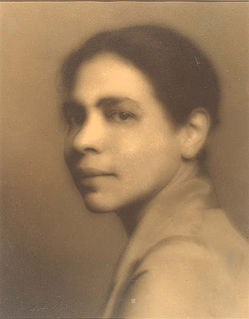A Quote by Jeanne DuPrau
Mrs. Murdo, walkind even more briskly to keep her spirits up, was crossing Harken Square when something fell to the pavement just in front of her with a terrific thump. How extraordinary, she thought, bending to pick it up. It was sort of a bundle. She began to untie it.
Related Quotes
Suddenly she felt strong and happy. She was not afraid of the darkness or the fog and she knew with a singing in her heart that she would never fear them again. No matter what mists might curl around her in the future, she knew her refuge. She started briskly up the street toward home and the blocks seemed very long. Far, far too long. She caught up her skirts to her knees and began to run lightly. But this time she was not running from fear. She was running because Rhett's arms were at the end of the street.
She stood there until something fell off the shelf inside her. Then she went inside there to see what it was. It was her image of Jody tumbled down and shattered. But looking at it she saw that it never was the flesh and blood figure of her dreams. Just something she had grabbed up to drape her dreams over.
She was beautiful, but not like those girls in the magazines. She was beautiful, for the way she thought. She was beautiful, for the sparkle in her eyes when she talked about something she loved. She was beautiful, for her ability to make other people smile, even if she was sad. No, she wasn't beautiful for something as temporary as her looks. She was beautiful, deep down to her soul. She is beautiful.
She lay on her back and walked her fingers down her ribs, skipped them over her abdomen, and landed on her pelvic bones. She tapped them with her Knuckles. [. . .] I can hear my bones, she thought. Her fingers moved up from her pelvic bones to her waist. The elastic of her underpants barely touched the center of her abdomen. The bridge is almost finished, she thought. The elastic hung loosely around each thigh. More progress. She put her knees together and raised them in the air. No matter how tightly she pressed them together, her thighs did not touch.
She realized how many of her beliefs were either unrealistic or belonged to her deceased parents and her ex-husband. She also realized that her expectations for herself and others were sometimes too rigid. She was trying to live up to what everyone else said was best for her, which made her depressed and hard to be around at times. Once she changed her beliefs about herself and others, she began to smile more and enjoy life.
"She (Minnie Ruth Solomon) was unusual because even though I knew her family was as poor as ours, nothing she said or did seemed touched by that. Or by prejudice. Or by anything the world said or did. It was as if she had something inside her that somehow made all that not count. I fell in love with her some the first time we ever talked, and a little bit more every time after that until I thought I couldn't love her more than I did. And when I felt that way, I asked her to marry me . . . and she said she would."
You must learn her. You must know the reason why she is silent. You must trace her weakest spots. You must write to her. You must remind her that you are there. You must know how long it takes for her to give up. You must be there to hold her when she is about to. You must love her because many have tried and failed. And she wants to know that she is worthy to be loved, that she is worthy to be kept. And, this is how you keep her.
I sit on the couch watching her arrange her long red hair before my bedroom mirror. she pulls her hair up and piles it on top of her head- she lets her eyes look at my eyes- then she drops her hair and lets it fall down in front of her face. we go to bed and I hold her speechlessly from the back my arm around her neck I touch her wrists and hands feel up to her elbows no further.
But she did not take her eyes from the wheels of the second car. And exactly at the moment when the midpoint between the wheels drew level with her, she threw away the red bag, and drawing her head back into her shoulders, fell on her hands under the car, and with a light movement, as though she would rise immediately, dropped on her knees. And at the instant she was terror-stricken at what she was doing. 'Where am I? What am I doing? What for?' She tried to get up, to throw herself back; but something huge and merciless struck her on the head and dragged her down on her back.
She had sacrificed her childhood to save her brothers; she loved her family above all else, and her spirits yearned to return home once more, to the wild forest and the land of mystic tales and ancient spirits whence he had taken her. That was the place of her heart, and if he loved her, he must let her go.
Somewhere, within her, in a deep recess, crouched discontent. She began to lose confidence in the fullness of her life, the glow began to fade from her conception of it. As the days multiplied, her need of something, something vaguely familiar, but which she could not put a name to and hold for definite examination, became almost intolerable. She went through moments of overwhelming anguish. She felt shut in, trapped.
We worked all the time, just worked and then we would be hungry and my mother was clearing up a new ground trying to help feed us for $1.25 a day. She was using an axe, just like a man, and something flew up and hit her in her eye. It eventually caused her to lose both of her eyes and I began to get sicker and sicker of the system there. I used to see my mother wear clothes that would have so many patches on them, they had been done over and over and over again. She would do that but she would try to keep us decent.
She had always been a reader… but now she was obsessed. Since her discovery of the book hoard downstairs from her job, she’d been caught up in one such collection of people and their doings after the next…The pleasure of this sort of life – bookish, she supposed it might be called, a reading life – had made her isolation into a rich and even subversive thing. She inhabited one consoling or horrifying persona after another…That she was childless and husbandless and poor meant less once she picked up a book. Her mistakes disappeared into it. She lived with an invented force.





































